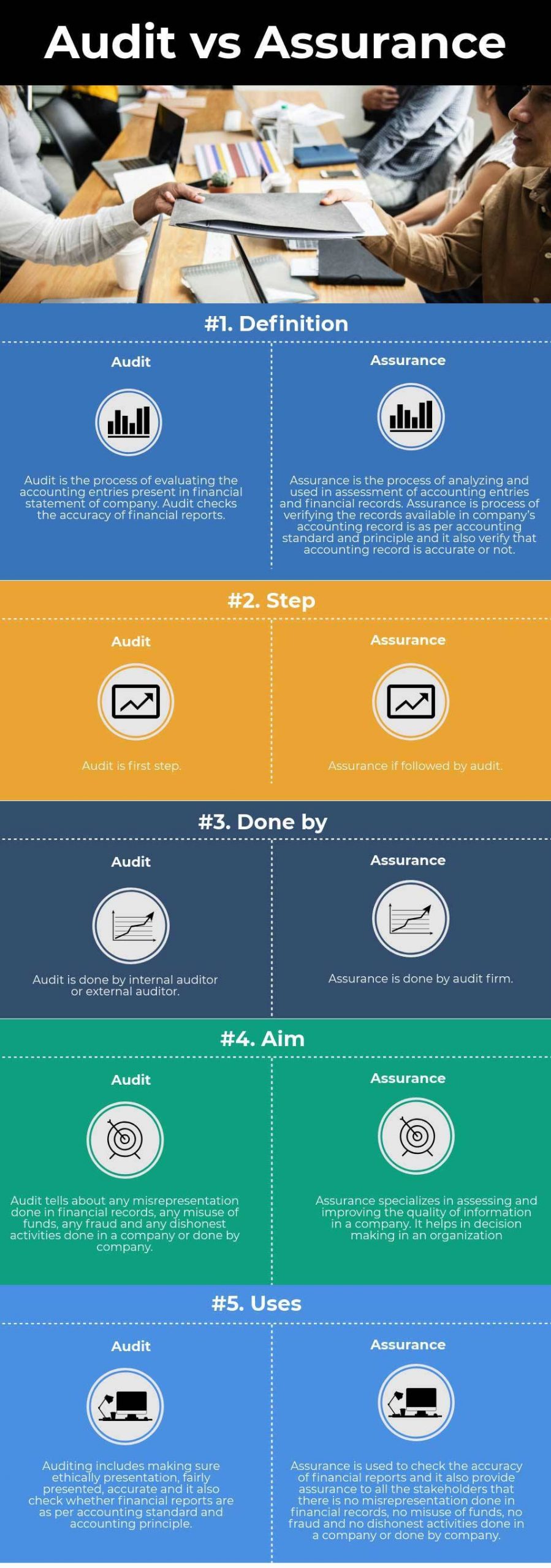
Audit and Assurance
An audit is a systematic review and assessment of information or documents.
There are a few different types of audit but, in the specific context of professional services, an audit is usually financial. It is intended to provide reasonable assurance, but not absolute assurance, that the financial statements give a true and fair view in accordance with the financial reporting framework.
Not all companies are required by law to have audits. Many companies who do not require audits by law opt to have their financial information assured independently, usually by accountancy firms.
Assurance is a professional service with the aim of improving the quality and transparency of information, to reduce the chance of problems occurring from incorrect information. An audit is a type of assurance service.
Assurance services can be regulatory or compliance-based. They work to ensure that a company or organisation is following guidelines, rules and policy, and provide both internal and external confidence for financial statements.
Advantages of Performing a Financial Audit
There are many benefits that a business entity can avail by conducting a financial audit. The key advantages are:
Maintain Consistency
If during an audit the auditor finds that the reports are not according to the rules and regulation as set by the concerned authorities of the government, he may suggest of following the laws of the government. By being compliant with the specified provisions, the Auditing process may take lesser time.

Financial Auditing
Helps in Insurance
While claiming insurance, the insurance company will first conduct an audit to determine the extent of damage done, and accordingly, they decide the value of the amount to be given by them. Thus an audit can help a company to come to valid insurance compensation.
Determine Profit or Loss
A Financial Audit will provide a complete summary of all the workings of the company which would be very helpful for the management of the company to define the profit or loss caused to the company by its activities. Accordingly, a businessperson would take decisions to grow and strengthen the company further.
Helps in Obtaining Loan
As the financial books have been reviewed and audited, they would project the right image of the business and thus allow banks and other financial institutions to give out loans and other financial help to the company. A company must maintain the financial records of at least the previous five years and also have the audit report for the corresponding years.
Helps during Winding Up
One of the main jobs of an auditor is to value all the assets and liabilities of the company. As a correct valuation would be present, it would be easier for the management of the company to find the right buyer for the company in case the company decides to wind up the company.
Assists in Determining the Total Tax
In a way, the tax authorities are dependent on the auditors because the profit calculated by the auditors is considered as the final one and based on this calculated profit the tax authorities assess the taxes of the company.
Helps Prepare Future Plans
An audit is conducted at regular intervals which facilitates comparison of the reports in each of the quarters. Since all the audited statements are considered correct and accurate, it would help the management to plan for the future of the business and take decisions which would allow the company to go further than its competition.
Provides Evidence
The complete and thorough check of all the transactions and books of accounts will ultimately result in the accumulation of a lot of financial data of the company by the auditor. As this data is having a basis and can be shown, in a case when an auditor is questioned upon the veracity of his findings of any malpractices in the company he can show the proof as to how did he reach his decision.
Increases Goodwill
It is known that an audit would bring out even the smallest details of the company and conducting an audit means that the company has nothing to hide which is a great booster to the morale of the present stakeholders of the company. Also, it will send out a message to the potential investors that the company is clean and has nothing to hide which will ultimately boost the goodwill of the company.
The points as mentioned above make it very clear that there are numerous benefits which a company can avail by conducting a financial audit of the company. Without an audit of the company, it would be very challenging to determine the exact financial picture of the company and pinpoint any flaw in the workings of the entity. As the size of the company would increase, the audit process would grow more complex. Thus, the auditing of a company should only be done by a reputed and a professional auditor.
Assurance
The motive of assurance is not to correct the issues in accounting records but to measure the appropriateness as per accounting standards, principles and follow its compliance. Moreover, assurance is applied to other aspects such as to assess the procedures and processes followed in operations. In such a case, processes and operations are closely observed and assurance will be provided whether the process is being conducted on the basis of the specified procedure to obtain optimum results.
Assurance setting body IAASB has classified separate standards for each of the three subclassified assurance engagement.
Any engagement that can fulfill the below-mentioned assurance engagement criteria as follows:
- Three party relationship
- Subject matter
- Criteria
- Gathering appropriate evidence
- Expression of opinion
An appropriate measure that is required for an assurance engagement to be an audit engagement should be a reasonable level.
Head To Head Comparison between Audit vs Assurance(Infographics)
Below is the top 8 difference between Audit vs Assurance
